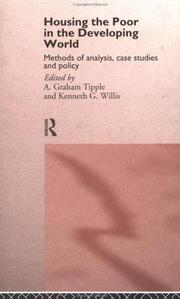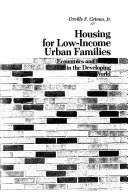| Listing 1 - 10 of 12 | << page >> |
Sort by
|

ISBN: 0415055393 Year: 1991 Publisher: London New York Routledge
Abstract | Keywords | Export | Availability | Bookmark
 Loading...
Loading...Choose an application
- Reference Manager
- EndNote
- RefWorks (Direct export to RefWorks)
Book
ISBN: 2110843918 9782110843913 Year: 1982 Publisher: [Paris] : Plan construction,
Abstract | Keywords | Export | Availability | Bookmark
 Loading...
Loading...Choose an application
- Reference Manager
- EndNote
- RefWorks (Direct export to RefWorks)
Housing --- Logement --- Congresses. --- Research --- Congrès --- Recherche --- Technical assistance, French --- Congresses --- Congrès --- Housing - Developing countries - Congresses --- Housing - Developing countries - Research - France - Congresses --- Technical assistance, French - Congresses
Book
ISBN: 0821396552 0821397982 Year: 2013 Publisher: Washington, D.C. : The World Bank,
Abstract | Keywords | Export | Availability | Bookmark
 Loading...
Loading...Choose an application
- Reference Manager
- EndNote
- RefWorks (Direct export to RefWorks)
The vast majority of rental housing around the world is unsubsidized and in private hands. Everywhere there are great needs for safe, decent, and affordable housing at the lowest income levels. A few countries-mostly developed ones-have a sizable social rental sector, yet even here the demand cannot be met and there are often long waiting lists for subsidized housing in the main cities. In most emerging economies, the only affordable rentals available are in the informal sector, with poor housing conditions and little security of tenure.This book is an effort to bring rental housing to the for
Housing policy -- Developing countries. --- Rental housing -- Developing countries. --- Rental housing --- Housing policy --- Business & Economics --- Real Estate, Housing & Land Use --- Housing --- Real estate business --- Rent

ISBN: 0801818540 0801818532 9780801818547 Year: 1976 Publisher: Baltimore Johns Hopkins university press
Abstract | Keywords | Export | Availability | Bookmark
 Loading...
Loading...Choose an application
- Reference Manager
- EndNote
- RefWorks (Direct export to RefWorks)
Sociology of environment --- Third World: economic development problems --- Developing countries --- Housing --- Low-income housing --- 339.96 --- 711.4 <1-722> --- Poor --- -711 --- Disadvantaged, Economically --- Economically disadvantaged --- Impoverished people --- Low-income people --- Pauperism --- Poor, The --- Poor people --- Persons --- Social classes --- Poverty --- Ontwikkelingshulp. Ontwikkelingssamenwerking. Ontwikkelingsproblematiek --- Gemeentelijke planologie. Stadsplanning. Stedenbouw--?<1-722> --- -Ruimtelijke ordening. Planologie. Stedebouw --- Economic conditions --- 711 Ruimtelijke ordening. Planologie. Stedebouw --- Ruimtelijke ordening. Planologie. Stedebouw --- 711.4 <1-722> Gemeentelijke planologie. Stadsplanning. Stedenbouw--?<1-722> --- 339.96 Ontwikkelingshulp. Ontwikkelingssamenwerking. Ontwikkelingsproblematiek --- 711 --- Inclusionary housing programs --- Developing countries: economic development problems --- Housing - Developing countries --- Low-income housing - Developing countries
Book
ISBN: 0047110236 9780047110238 Year: 1987 Publisher: London Allen and Unwin
Abstract | Keywords | Export | Availability | Bookmark
 Loading...
Loading...Choose an application
- Reference Manager
- EndNote
- RefWorks (Direct export to RefWorks)
Sociology of environment --- Economic geography --- Developing countries --- Housing --- Housing policy --- Logement --- Politique gouvernementale --- -Housing policy --- -Housing --- Housing and state --- State and housing --- City planning --- Social policy --- Affordable housing --- Homes --- Houses --- Housing needs --- Residences --- Slum clearance --- Urban housing --- Dwellings --- Human settlements --- Government policy --- Social aspects --- Housing - Developing countries --- Housing policy - Developing countries
Book
ISBN: 3642422632 354077856X 9786613080141 3540778578 1283080141 Year: 2011 Publisher: Heidelberg : Springer,
Abstract | Keywords | Export | Availability | Bookmark
 Loading...
Loading...Choose an application
- Reference Manager
- EndNote
- RefWorks (Direct export to RefWorks)
The growth of urban areas and population in middle and low income countries is a continuing trend. Urbanization expands as rural to urban migration offers better income opportunities in cities. This trend is both a source of development opportunities and challenges for the housing sector. On the one hand, housing is a large and growing market, and on the other, massive slums confirm the poor housing conditions in many developing countries. These adverse conditions mirror inadequate housing policies, inefficient or absent property registration, as well as limits to access to housing finance. Provision of affordable housing is therefore an important topic in the fight against poverty. This book focuses on solutions that improve the enabling environment for the poor in accessing housing finance. It explores how to develop and integrate housing finance into a sustainable financial system for developing countries and offers ways in which low-income families can obtain better access to housing finance. This book provides a conceptual framework for housing finance development and addresses practical solutions in the provision of housing finance and compares different approaches. The global financial crisis which originated in the US sub-prime housing market has not altered the underlying reality of global housing finance: the majority of people in developing countries still do not have access to formal housing finance. Nor has it answered the biggest question: how can they be served in a sustainable way? Connecting this unserved group to appropriate housing finance products through robust financial systems must remain a top policy priority if these nations are to enjoy long term, broad-based economic growth. It is also a great opportunity for new and existing housing finance providers. DAVID PORTEOUS, Director, Bankable Frontier Associates Where property in the form of private homes is secure, people can focus on work rather than protecting their property. One of the major effects of the property rights reform driven by Hernando de Soto in Peru put more children into school. Why? Adults spent less time safeguarding their property and could search for and find better jobs. This enabled them to send their children to school. Houses are also important for those who start up businesses. The most practical source of finance beyond help from family and friends tends to be a mortgage on property. For a mortgage market to develop, banks have to be able to foreclose on property of those who cannot pay back. The obvious attractions of housing policy as a plank of social policy can also lead to policies that backfire, as the recent example of the United States shows. Housing finance is a major component of the fight against poverty. For property to yield all its benefits, institutional reforms are required – chief among them secure property rights for owners and enforceable creditor rights for financiers. Sensible regulations for zoning and construction also help. However, political pressure on banks to ignore the credit risk of home ownership or to cease foreclosures when things go wrong risks undermining sustainable housing finance. MICHAEL KLEIN, Consultant, Former Chief Economist International Finance Corporation (IFC).
Housing -- Developing countries -- Finance. --- Housing policy -- Developing countries. --- Housing --- Low-income housing --- Poor --- Business & Economics --- Economic Theory --- Real Estate, Housing & Land Use --- Finance --- Finance. --- Home finance --- Housing finance --- Macroeconomics. --- Development economics. --- Economics. --- Development Economics. --- Finance, general. --- Macroeconomics/Monetary Economics//Financial Economics. --- Economics --- Funding --- Funds --- Currency question --- Economic development

ISBN: 0720116368 9780720116366 Year: 1982 Publisher: London Mansell
Abstract | Keywords | Export | Availability | Bookmark
 Loading...
Loading...Choose an application
- Reference Manager
- EndNote
- RefWorks (Direct export to RefWorks)
Politics --- Private houses --- Sociology --- Architecture --- Social policy --- Developing countries --- Self-help housing --- -351.778.5 <41> --- Housing --- Ruimtelijke ordening. Volkshuisvesting. Plannen van aanleg. Woningbouw.--Woonhygiene, zie {613.5}; z.o. {?711.6-164}--Verenigd Koninkrijk van Groot-Brittannië en Noord-Ierland --- 351.778.5 <41> Ruimtelijke ordening. Volkshuisvesting. Plannen van aanleg. Woningbouw.--Woonhygiene, zie {613.5}; z.o. {?711.6-164}--Verenigd Koninkrijk van Groot-Brittannië en Noord-Ierland --- 351.778.5 <41> --- Self-help housing - Developing countries
Book
ISBN: 0249441497 9780249441499 Year: 1977 Publisher: London Hill
Abstract | Keywords | Export | Availability | Bookmark
 Loading...
Loading...Choose an application
- Reference Manager
- EndNote
- RefWorks (Direct export to RefWorks)
Housing --- Urbanization --- Urbanisation --- Logement --- -Housing --- -Urbanization --- -#SBIB:316.334.5U20 --- Cities and towns, Movement to --- Urban development --- Urban systems --- Cities and towns --- Social history --- Sociology, Rural --- Sociology, Urban --- Urban policy --- Rural-urban migration --- Affordable housing --- Homes --- Houses --- Housing needs --- Residences --- Slum clearance --- Urban housing --- City planning --- Dwellings --- Human settlements --- Sociologie van stad (buurt, wijk, community, stadsvernieuwing) --- Social aspects --- Wonen --- Algemeen. --- #SBIB:316.334.5U20 --- Housing - India - Delhi --- Housing - Developing countries --- Urbanization - Developing countries

ISBN: 0582480647 9780582480643 Year: 1975 Publisher: London Longman
Abstract | Keywords | Export | Availability | Bookmark
 Loading...
Loading...Choose an application
- Reference Manager
- EndNote
- RefWorks (Direct export to RefWorks)
Housing --- Squatter settlements --- Squatters --- Logement --- Bidonvilles --- Pays en développement --- -Squatter settlements --- -Squatters --- -Occupancy (Law) --- Public lands --- Informal settlements (Squatter settlements) --- Irregular settlements --- Settlements, Spontaneous --- Settlements, Squatter --- Shack towns --- Shanty towns --- Shantytowns --- Spontaneous settlements --- Uncontrolled settlements --- Cities and towns --- Slums --- Affordable housing --- Homes --- Houses --- Housing needs --- Residences --- Slum clearance --- Urban housing --- City planning --- Dwellings --- Human settlements --- Social aspects --- Geografie --- Sociale geografie --- Bewoning en leefgemeenschap. --- -Housing --- Pays en développement --- Occupancy (Law) --- Housing - Developing countries --- Squatter settlements - Developing countries --- Squatters - Developing countries
Book
ISBN: 0198740840 0198740832 9780198740841 9780198740834 Year: 1989 Publisher: Oxford Oxford university press
Abstract | Keywords | Export | Availability | Bookmark
 Loading...
Loading...Choose an application
- Reference Manager
- EndNote
- RefWorks (Direct export to RefWorks)
-Housing --- -Poor --- -Sociology, Urban --- -#SBIB:327.4H62 --- Affordable housing --- Homes --- Housing needs --- Urban housing --- Sociology of environment --- Economic geography --- Developing countries --- Urbanization --- Cities and towns --- Poor --- Sociology, Urban --- Housing --- Sociology, Urban. --- Case studies. --- Global cities --- Municipalities --- Towns --- Urban areas --- Urban systems --- Human settlements --- Urban sociology --- Case studies --- #SBIB:327.4H62 --- Derde wereld: rurale, stedelijke ontwikkeling --- Urbanization - Developing countries --- Cities and towns - Developing countries - Case studies --- Poor - Developing countries --- Housing - Developing countries
| Listing 1 - 10 of 12 | << page >> |
Sort by
|

 Search
Search Feedback
Feedback About UniCat
About UniCat  Help
Help News
News